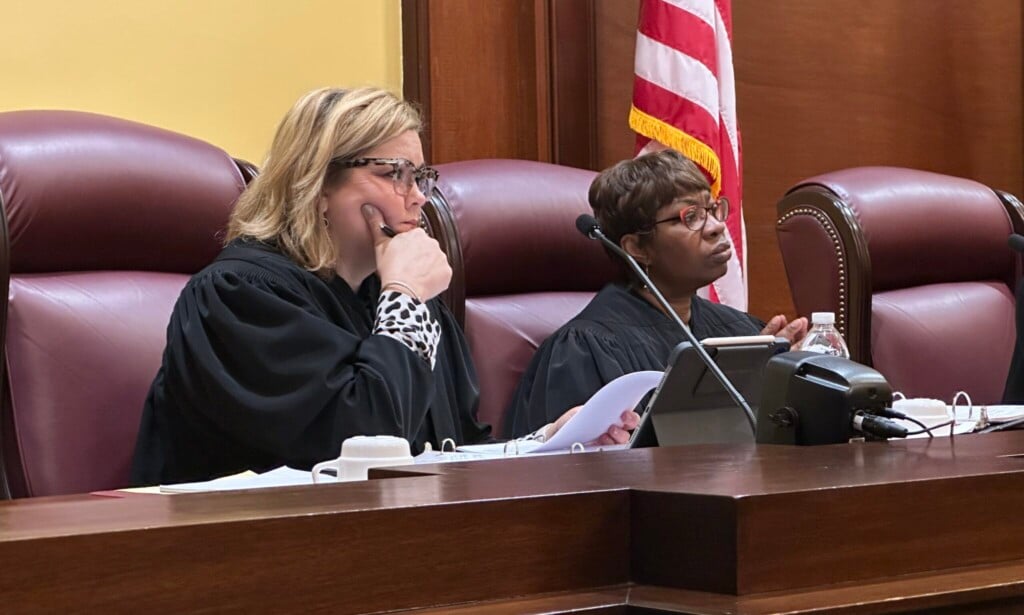Lawrence YouTuber, Mr. Beat, releases a new book on the history of the Supreme Court
Newcomers to politics will feel more than welcome as Beat catches them up on 100 of the most important Supreme Court decisions in American history.
The U.S. Supreme Court is all the rage right now, or at any rate the source of it—and yet, the majority of us really don’t know much about the institution aside from a cursory understanding of a handful of landmark cases like Plessy v. Ferguson (1896), Brown v. Board (1954), Loving v. Virginia (1967), Roe v. Wade (1973), and Obergefall v. Hodges (2014).
LFK-based history YouTuber Matt Beat—better known by his 815,000 subscribers as Mr. Beat—has done his best to fill in those blanks and/or get you up to speed with his second book, The Power of Our Supreme Court: How Supreme Court Cases Shape Democracy.
At 296 pages, this June 20 release from Florida-based indie firm Mango Publishing is a polished, easy-to-read collection of 100 Supreme Court decisions Beat thinks you should know about.
“We find things that don’t mean anything to us boring. If we can’t connect with something, or see how it’s relevant to our daily lives, how can we possibly be interested in it?” asks Matt Beat in the introduction, which is frankly titled “Why I Wrote This Stuff.”
The final product is sprinkled with Beat’s signature, laid back, dad-joke-tinged conversational tone, but in writing. In the earlier cases, it’s common to see one of our nation’s fathers referred to as the “Founding Dudes.”
The vernacular is not the only part of the project that lends itself well to newcomers or the attention-deficit. The footnotes you’d expect to see in a legal nonfiction like this aren’t staggered and buried at the end of the book as they typically are, but are instead direct links to web addresses the bottom of the page.
It’s a habit that Beat has maintained from his grad school days at Emporia State, where he enrolled in a course on the U.S. Supreme Court that would pique his interest in the subject.
“These are just ordinary Americans—well, most of them, some of them were actually not American—who are all of a sudden just thrust into history. That always just fascinated me, that it’s made up of these seemingly random people, but now everybody knows their names,” Beat says.
Each case is indexed by year and presented in two or three pages, with a clear dividing point where the questions the court had to consider in the case were summarized before Beat recaps the final ruling and its historical implication.
The selections encompass those aforementioned major historical, or “landmark” cases, but, as Beat points out early in the text, there isn’t a strict count on what constitutes a “landmark decision,” The National Constitution Center has the number at about 70, for example, whereas Wikipedia lists 423.
“Put another way, a landmark court decision is a freaking important Supreme Court decision,” Beat writes on page 31.
Beat also includes a few more lesser-known gems including Jacobson v. Massachusetts (1905), in which the court decided that a mandatory vaccination law—in response to an attempt to fully eradicate smallpox (the only disease in human history to be 3-stocked)—did not go against the Fourteenth Amendent.
The 7-2 outcome, Beat explains, “set a precedent that sometimes the freedom of the individual has to be limited in the name of general welfare.”
Another is Brandenburg v. Ohio (1969), a case concerning a Cincinnati KKK gathering, where the defendant and KKK guy Clarence Brandenburg said: “if our president, our Congress, and our Supreme Court continue to supress the white, caucasian race, it’s possible that there might have to be some revengeance taken.”
“I don’t know what reveangance means,” Beat writes in response on page 167. “I looked it up online, and Urban Dictionary says it’s ‘the act of gaining revenge at a rate of at least 2.54 times greater to that of standard revenge.’ That doesn’t seem too nice to me. It seems threatening.”
An Augusta, Kansas native, Beat is a former public schools teacher who has taught American history at Tonganoxie High School and at middle school and high schools in the Blue Valley School District.
In 2021, with his viewership continuing to expand, he finally decided to hang up the erasers to focus on reaching a vastly larger worldwide audience.
“It was a little scary at first. Like there’s still a lot of people that don’t understand how I make money and so I have to explain it to them. They’ll say ‘you had a job as a teacher, why would you leave that when you had benefits?’ And, you know, people just don’t understand how little teachers get paid,” Beat says.
Now, however, his reach continues to expand with his videos having pulled a combined 187,731,512 views at the time this article was written. Among Mr. Beat’s most popular series is “Supreme Court Briefs,” which helped spur the writing of this book. Others include state-by-state comparisons such as “Why Kansas hates Missouri”.
While his first book, “The Ultimate American Presidential Election Book: Every Presidential Election in American History (1788-2020),” published on July 14, 2020, was primarily constructed from reformatted video scripts, this one took far more extensive bouts of research.
While he was in the thick of it, Beat realized that even he—who had taught much more on the Supreme Court in his former curriculum than the abysmal amount required by the Kansas State Legislature—hadn’t always been right about some of the details.
“A lot of the stuff that I referenced actually used to be materials I had in the classroom. I found out by writing this book that some of it was factually inaccurate. I went back and I actually read oral arguments a lot deeper than I would be for just teaching government to high schoolers,” Beat says. “It was just, you know, some small details, but still—it kind of got me thinking about it: like, ‘man, what else are we taught in school that actually is factually inaccurate?”
As a Kansan, an appreciator of Dwight D. Eisenhower who lists George Washington as his favorite president above Honest Abe (even greater blasphemy than putting anyone ahead of MJ), Beat seems to always be able to toe a line in a politically fragmented society that has unlimited access to the comment section.
“It’s probably obvious to most people that I lean to the left. But what’s interesting is that, growing up, I leaned to the right into my twenties. When I was in college, I actually called myself a libertarian,” Beat says. “Then I got older and realized labels overall are pretty ridiculous, and that I’m kind of all over the place, and so I don’t even label myself which helps.”
“Another thing is that I’m transparent. I did political tests on a live stream, just so I can know exactly where I stood,” Beat adds. “But, I think the thing that helps me more than anything is (and obviously, no one is not biased) I’m kind of a contrarian. I kind of have this outsider mentality where I’m never fully comfortable with any position or or within any tribe or anything like that.”
In “The Power of Our Supreme Court”—as well as across his various web and streaming enterprises and multiple YouTube channels—Beat attempts to present history to those who may not have had the time to otherwise delve into it.
Furthermore, he wants readers (and viewers) to understand that, while our current political climate is certainly divisive, that the court, historically, has been able to come together. Even if this seems like a far-flung prospect for the current court.
“People say that, ‘oh, they’re way too political’, and they are obviously, to a certain extent,” Beat says. “But I would say two things in response to that. One, they’ve always been this way. If you look at the whole history of them… I mean, hello, John Marshall!”
“My second point is, if you actually look at all the cases—and don’t just focus on the ones that get all immediate attention—there are actually a lot of cases where the justices agree, and they actually have had a lot more in common than we realize,” Beat says.





